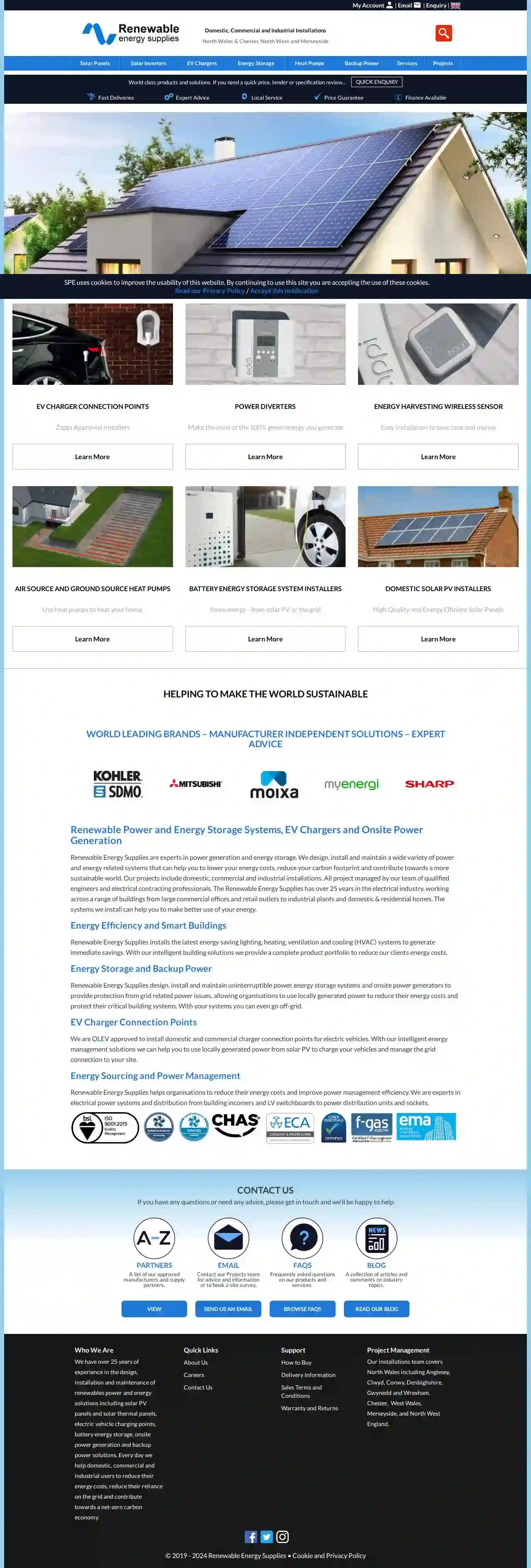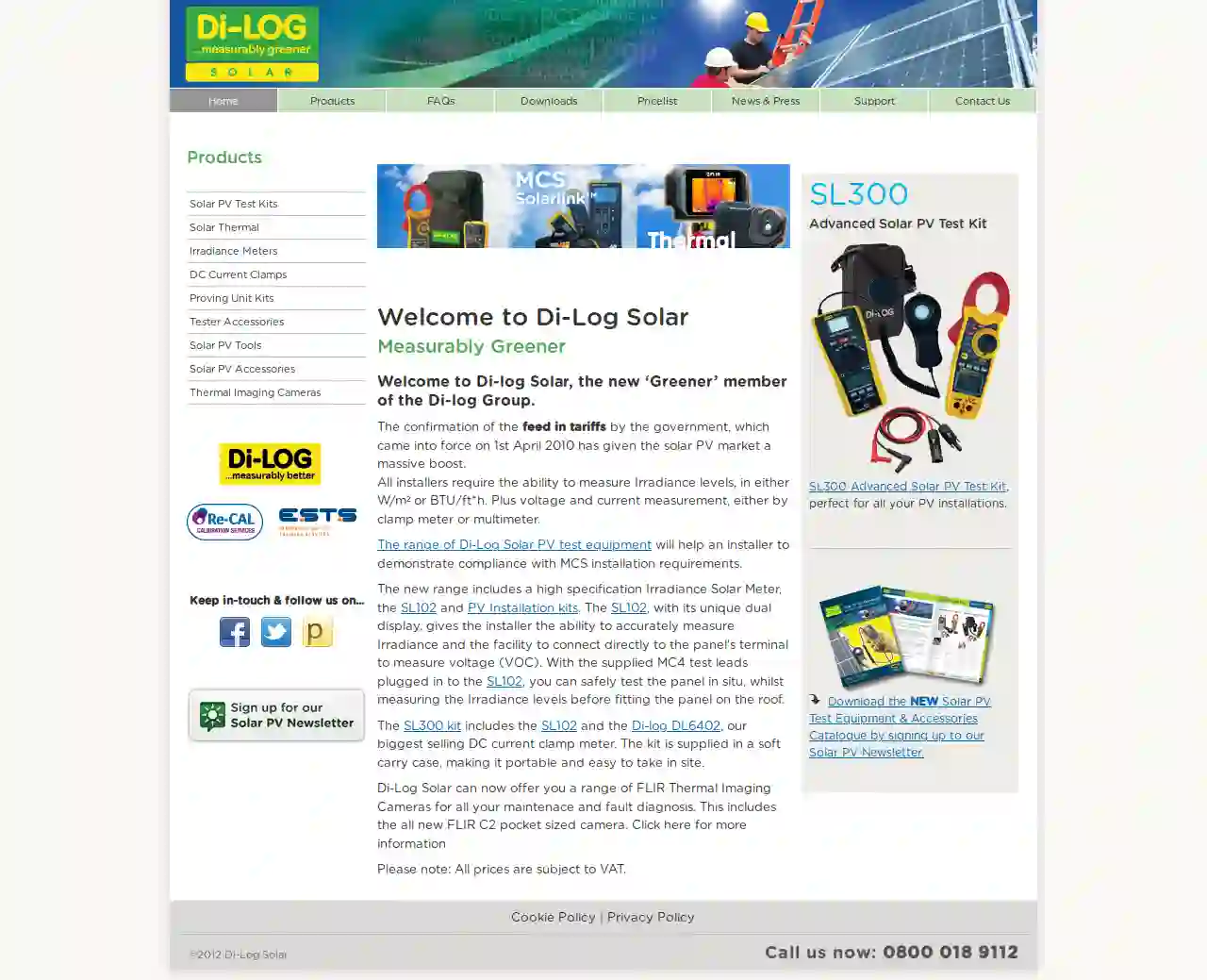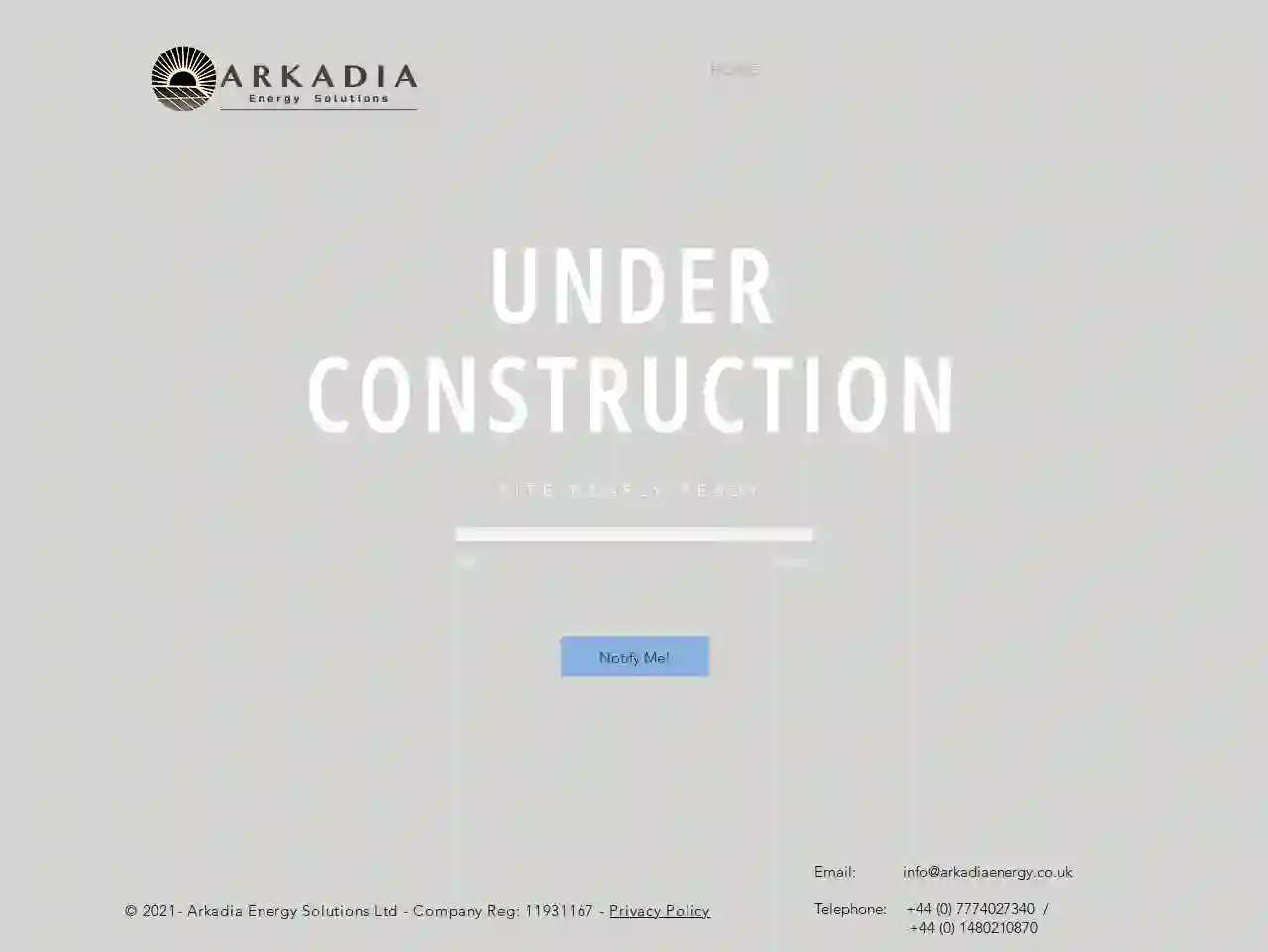Solar Installers Willaston
Find Solar Contractor in Willaston
Receive multiple Solar Installer quotes for your project today! Compare profiles, reviews, accreditations, portfolio, etc... and choose the best deal.

KAST Renewable Energies
41 reviewsMarket Place, Merchant House, Stockport, SK1 1EU, GBKAST Renewable Energy is a specialist renewable technology group based in Manchester. We specialise in installing solar panels for commercial customers all over the North West. We employ cutting-edge technologies to minimise your business's carbon footprint and offer a cost-effective energy solution. KAST is a Renewable Energy Technologies Group based in Manchester. We help all of our customers reduce their energy bills and carbon footprint. Producing feasibility studies, energy reduction plans, project management and supply a wide range of sectors including Commercial, Industrial and Public Sector properties. As a result of our expertise, we deliver strategies to improve knowledge and gain an understanding of how and when your energy is used.
- Services
- Why Us?
- Gallery
Get Quote
Manchester Renewables LTD
51 reviewsManchester, M1 1AA, GBAt Manchester Renewables, we help you take control of your energy bills with premium solar panel installations. Our friendly, expert team covers Greater Manchester, providing quick seamless installations. We supply and fit all of Manchester with renewable energy products, from Solar PV Systems, EV Charging Points, Battery Storage and Heat Pumps. Our expert teams are all MCS & RECC accredited, providing you with the highest quality installations, using the best and most efficient systems on the market today. Get in touch today for a free quotation & survey.
- Services
- Why Us?
- Accreditations
- Our Team
- Testimonials
- Gallery
Get Quote
Kingspan Energy Ltd.
Kingspan House, Westbury, SN16 0AS, GBKingspan Water & Energy is a leading global provider of innovative and sustainable solutions for the water and energy sectors. With a rich history of engineering excellence and a commitment to environmental responsibility, we offer a comprehensive range of products and services designed to meet the evolving needs of our customers. Our expertise spans across various applications, including water treatment, distribution, storage, and energy efficiency. We are dedicated to delivering high-performance, reliable, and cost-effective solutions that contribute to a more sustainable future.
- Services
- Why Us?
Get Quote
Renewable Energy Supplies
Chester, GBRenewable Energy Supplies are experts in power generation and energy storage. We design, install and maintain a wide variety of power and energy related systems that can help you to lower your energy costs, reduce your carbon footprint and contribute towards a more sustainable world. Our projects include domestic, commercial and industrial installations. All project managed by our team of qualified engineers and electrical contracting professionals. The Renewable Energy Supplies has over 25 years in the electrical industry, working across a range of buildings from large commercial offices and retail outlets to industrial plants and domestic & residential homes. The systems we install can help you to make better use of your energy. Energy Efficiency and Smart Buildings Renewable Energy Supplies installs the latest energy saving lighting, heating, ventilation and cooling (HVAC) systems to generate immediate savings. With our intelligent building solutions we provide a complete product portfolio to reduce our clients energy costs. Energy Storage and Backup Power Renewable Energy Supplies design, install and maintain uninterruptible power, energy storage systems and onsite power generators to provide protection from grid related power issues, allowing organisations to use locally generated power to reduce their energy costs and protect their critical building systems. With your systems you can even go off-grid. EV Charger Connection Points We are OLEV approved to install domestic and commercial charger connection points for electric vehicles. With our intelligent energy management solutions we can help you to use locally generated power from solar PV to charge your vehicles and manage the grid connection to your site. Energy Sourcing and Power Management Renewable Energy Supplies helps organisations to reduce their energy costs and improve power management efficiency. We are experts in electrical power systems and deliver tailored solutions to meet our clients' specific needs.
- Services
- Why Us?
- Gallery
Get Quote
Di-Log Solar
Trafford Park, Manchester, 28 Wheel Forge Way, M17 1EH, GBDi-Log Solar is a new member of the Di-Log Group, specializing in 'Greener' solar solutions. The company's range of solar PV test equipment helps installers demonstrate compliance with MCS installation requirements. Their products include the SL102 Irradiance Solar Meter, which offers a unique dual display for accurate Irradiance and voltage measurement, and the SL300 kit, which combines the SL102 with the DL6402 DC current clamp meter. Di-Log Solar also offers FLIR Thermal Imaging Cameras for maintenance and fault diagnosis. All prices are subject to VAT.
- Services
- Why Us?
- Accreditations
- Gallery
Get Quote
Green Energy International Limited
Chester, GBGreen Energy International Limited operates in the renewable energy market, with a successful track record in delivering solar energy & battery storage projects across the UK. As a team we have been successfully operating in the renewables market for over 10 years, developing utility scale solar PV. We locate, assess, design, and prepare the project from conception through to installation. We are proud to be helping the UK increase its renewable energy generation.
- Services
- Why Us?
- Testimonials
- Gallery
Get Quote
Arkadia Energy
Chester, GBArkadia Energy Solutions Ltd is a company dedicated to providing sustainable energy solutions. We are currently constructing a new site which will be operational soon. You can sign up to be notified when the site is ready. Contact us for more information about our services.
- Services
- Why Us?
- Gallery
Get Quote
Teknisolar Ltd
Piana della Zingaria, 2, Traversa C, Monteodorisio, 66050, GBTeknisolar is a company specializing in high-performance PV panel manufacturing technology. They pride themselves on being at the forefront of innovation, offering a unique membrane-less laminator that sets them apart from the competition. Their Robostak™ laminator is a prime example of their commitment to combining cutting-edge technology with Italian craftsmanship. Teknisolar's Robostak™ boasts several advantages, including increased revenue potential, unique flexibility, and significant cost reduction. The membrane-less design eliminates the risk of sudden membrane ruptures and scrapped modules, while the quick vacuum system and uniform heating ensure efficient operation with minimal maintenance. The company emphasizes the Robostak™'s ability to reduce cycle costs and consumables, leading to a sixfold increase in revenue. Furthermore, it offers reduced downtime for membrane changes, eliminates belt cleaning, minimizes power consumption, and lowers manual labor costs. Teknisolar's commitment to research and development is evident in their continuous pursuit of faster lamination times. Their single lamination line allows for 7.5 times faster lamination compared to traditional methods, resulting in significant energy cost savings. The company's dedication to quality is reflected in their UNI EN ISO 9001:2015 quality certification. Teknisolar's flexible system caters to various solar panel system needs, requiring no extra tools. Teknisolar actively participates in industry events like Intersolar Europe and REI 2022, showcasing their innovative technology and engaging with potential clients. The company's website provides a wealth of information about their products, services, and achievements, including news updates, customer testimonials, and contact details.
- Services
- Why Us?
- Accreditations
- Our Team
- Gallery
Get Quote
Green Power Renewable Solutions Ltd
56 reviews41 Chester Street, Flint, CH6 5BL, GBGreenPower Renewables Solutions Ltd is a leading solar panel business based in Flintshire, North Wales. With over 9 years of experience in the solar industry and 15 years in electricals, they are committed to helping customers reduce their energy bills and carbon footprint. They are MCS Certified and Napit registered, installing solar panel systems across the UK. GreenPower Renewables offers a range of services including solar PV, batteries, EV chargers, inverter replacements, loft insulation, and bird protection. They pride themselves on clear communication with customers throughout the entire process.
- Services
- Why Us?
- Accreditations
- Gallery
Get Quote
Going Green
51 reviewsChester, GBGoing Green is the complete green hub, created to assist the UK’s sustainable transition to Net-Zero. Through a mixture of domestic and industrial renewable energy solutions, how-to guides for the home and workplace, and a library of e-learning courses, through the Going Green Academy. Going Green’s mission, is to empower everyone to be a part of the solution to the environmental issues we all face. Going Green is for everyone. We are the UK’s green platform to help translate the scientific language surrounding sustainability; giving you all the tools you need to make sustainable changes at home, at work and throughout your life. We want you to be part of our growing community and we are committed to doing the right thing for both you and our planet. At the heart of our mission is a desire to work with you on your going green journey, whether at home or at work. We will act as a trusted guide on your journey, encouraging and supporting you to go green one step at a time. Our aim is to give everyone the power to make informed decisions that support a sustainable, environmentally conscious future. We want to help make the UK truly environmentally sustainable. This is a future where growth and development allow us to meet our present needs without preventing future generations from meeting theirs.
- Services
- Why Us?
- Gallery
Get Quote
Over 3,485+ Solar Companies on our platform
Our solar experts operate in Willaston and surrounding areas!
SolarCompaniesHub has curated and vetted Top Solar Businesses in and around Willaston. Find the most trustworthy business today.
Frequently Asked Questions About Solar Installers
- Monocrystalline: Made from a single silicon crystal, known for high efficiency (typically 18-22%) and sleek black appearance.
- Polycrystalline: Made from multiple silicon crystals, slightly less efficient (15-17%) but often more affordable than monocrystalline.
- Thin-film: Made from thin layers of photovoltaic material, lower efficiency (8-12%) but can be flexible and lightweight.
- Adequate Sunlight: Unobstructed sunlight for a significant portion of the day.
- Sufficient Space: Enough space to accommodate the desired number of panels.
- Structural Integrity: A strong roof structure capable of supporting the weight of the panels.
- Appropriate Orientation and Tilt: Ideally, the roof should face south (in the Northern Hemisphere) or north (in the Southern Hemisphere) with a tilt angle close to the latitude of your location. However, other orientations and tilts can still be effective.
- Cash Purchase: The most straightforward option, providing the greatest long-term savings but requiring a larger upfront investment.
- Solar Loans: Loans specifically designed for solar installations, often with favorable terms and interest rates.
- Solar Leases: A third-party company owns the system and leases it to you, allowing you to go solar with little or no upfront cost, but you won't own the system or receive tax benefits.
- Power Purchase Agreements (PPAs): Similar to leases, but you pay for the electricity generated by the system, not the system itself.
- Home Equity Loans or Lines of Credit: Borrow against the equity in your home.
- Contact SolarCompaniesHub: We make it simple to connect with reputable Solar Installers in your area.
- Get Free Quotes: Request free quotes from multiple installers to compare prices, systems, and warranties.
- Schedule a Site Assessment: A qualified installer will visit your property to assess your roof, energy needs, and discuss your goals.
- Review Your Proposal and Contract: Carefully review the proposed system, financing options, and warranties before signing a contract.
- Installation and Activation: Once the contract is signed, the installer will obtain necessary permits, schedule the installation, and activate your solar system.
What are the different types of solar panels?
How do I know if my roof is suitable for solar panels?
How can I finance my solar panel installation?
How do I get started with solar panel installation?
What are the different types of solar panels?
- Monocrystalline: Made from a single silicon crystal, known for high efficiency (typically 18-22%) and sleek black appearance.
- Polycrystalline: Made from multiple silicon crystals, slightly less efficient (15-17%) but often more affordable than monocrystalline.
- Thin-film: Made from thin layers of photovoltaic material, lower efficiency (8-12%) but can be flexible and lightweight.
How do I know if my roof is suitable for solar panels?
- Adequate Sunlight: Unobstructed sunlight for a significant portion of the day.
- Sufficient Space: Enough space to accommodate the desired number of panels.
- Structural Integrity: A strong roof structure capable of supporting the weight of the panels.
- Appropriate Orientation and Tilt: Ideally, the roof should face south (in the Northern Hemisphere) or north (in the Southern Hemisphere) with a tilt angle close to the latitude of your location. However, other orientations and tilts can still be effective.
How can I finance my solar panel installation?
- Cash Purchase: The most straightforward option, providing the greatest long-term savings but requiring a larger upfront investment.
- Solar Loans: Loans specifically designed for solar installations, often with favorable terms and interest rates.
- Solar Leases: A third-party company owns the system and leases it to you, allowing you to go solar with little or no upfront cost, but you won't own the system or receive tax benefits.
- Power Purchase Agreements (PPAs): Similar to leases, but you pay for the electricity generated by the system, not the system itself.
- Home Equity Loans or Lines of Credit: Borrow against the equity in your home.
How do I get started with solar panel installation?
- Contact SolarCompaniesHub: We make it simple to connect with reputable Solar Installers in your area.
- Get Free Quotes: Request free quotes from multiple installers to compare prices, systems, and warranties.
- Schedule a Site Assessment: A qualified installer will visit your property to assess your roof, energy needs, and discuss your goals.
- Review Your Proposal and Contract: Carefully review the proposed system, financing options, and warranties before signing a contract.
- Installation and Activation: Once the contract is signed, the installer will obtain necessary permits, schedule the installation, and activate your solar system.